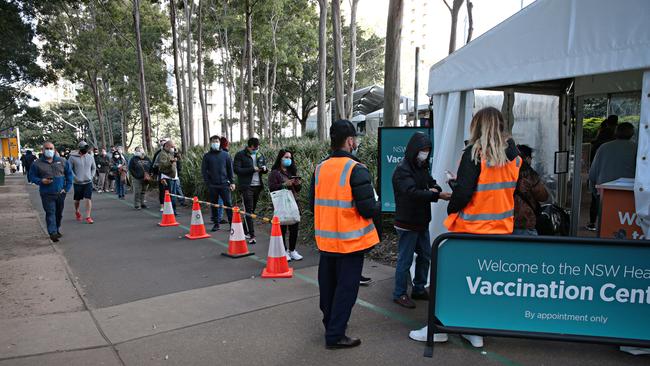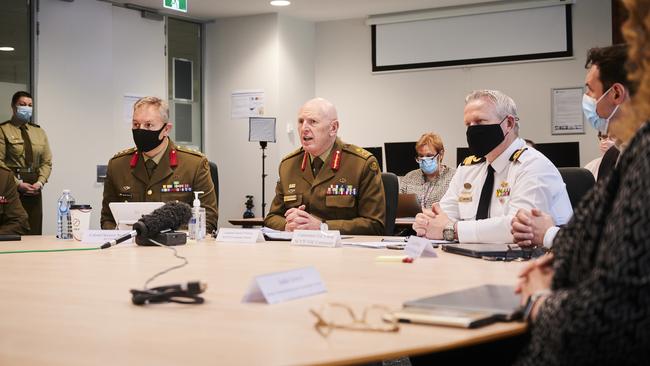
It is also clear that business is lining up to play a major role in the delivery as soon as it can get its hands on sufficient supplies – a move which will expand the rollout in coming months, especially into the younger age groups which were, until recently, blocked from access to vaccines.
A key person in the distribution process is Lieutenant General John Frewen, the Army veteran who has been running the federal government’s vaccine distribution task force since June 4.
Frewen has been involved in the rollout since he was chosen to head up the Australian Defence Organisation’s Covid-19 task force in March last year, stepping out of his then role as deputy principal director of the Australian Signals Directorate.
While there are reports of the straight-talking Frewen, who has served in Afghanistan and worked with the UN Assistance Mission for Rwanda, clashing in a national cabinet meeting with NSW Premier Gladys Berejiklian over just where vaccines should be directed in response to the western Sydney Delta variant outbreak, it is clear Frewen has struck up a good relationship with business leaders.
In a series of what he calls “war games” in recent weeks, Frewen has met with a range of leaders from different industry sectors including banking, aviation, telecoms, construction and mining to brief them on his plans and to discuss ways they can work together on the vaccine rollout.
The message from business leaders, who are concerned about the threat of the deadly Delta variant to the economy, is that they are happy to do whatever is asked of them.
There is almost universal agreement among the business community that mass vaccination is the key to coming out of the Covid nightmare, with some companies such as Qantas wrestling with the idea of making vaccines compulsory for staff.
While some business leaders – such as those in aviation, transport and retail – have been pushing for priority access to vaccinations for their staff who they see as frontline workers, other are concerned to be working with government so as they aren’t seen as “pushing in” the vaccine queues at a sensitive time.
Either way, vaccinations in the workplace are set to provide a key new distribution arm.
As more supplies become available, Frewen is aware of the importance of the role business can play.

Business leaders who attended this Tuesday’s video link with the Frewen task force included Virgin chief executive Jayne Hrdlicka, Sydney Airport CEO Geoff Culbert, Qantas chief customer officer Stephanie Tully, Business Council chief executive Jennifer Westacott, CEO of the Minerals Council of Australia Tania Constable, Master Builders Association boss Denita Wawn and the head of the Australian Petroleum Production and Exploration Association, Andrew McConville.
Other companies represented include Melbourne Airport, Canberra Airport, Toll, Rio Tinto and BHP.
Chief executives including Wesfarmers’ Rob Scott and the Commonwealth Bank’s Matt Comyn have also been involved in recent meetings with Frewen.
By and large big employers that already offer flu vaccines to their staff are ready to rollout Covid vaccines if they can get supplies.
At the moment there is plenty of the AstraZeneca vaccine while the Pfizer vaccine preferred for younger people is in short supply.
Frewen struck a deal with Comyn and Westpac CEO Peter King to agree to a pilot program of rolling out the AZ vaccine to customer facing staff, starting as early as next week in the eight local government area hot spots in southwest and western Sydney.
While agreeing to have the vaccine will be up to the staff themselves, reports are that those who are eligible are keen to do so, given the convenience of getting vaccinated at work. It will beat standing in line for hours at vaccination hubs such as Sydney Olympic Park. They are also pleased that the rollout includes their households.
Working with big companies gives the government another line of trusted connection into people in critical areas such as western Sydney where many people do not have English as their first language.
Westpac pointed out in a statement on Wednesday that it had some 10,000 staff living in the eight LGAs in Sydney.
Frewen has told other companies wanting to follow suit to get their processes worked out (most are planning to use the same provider as for their flu vaccines) so that once supplies are there they can be ready to go with their own workplace vaccination programs.
Business has a broad geographical reach which can be important in the rollout in coming months.
Another idea raised at the Tuesday discussion was using Perth Airport as a vaccination hub for fly-in fly-out workers in the mining industry.
Interest and urgency by businesses will differ from company to company.
KPMG chief executive Andrew Yates said his firm was happy to help with Covid vaccine program for its staff. But he expected that by the time the firm, which employs around 10,000 nationally, got sufficient access to the vaccine many staff would have already have had it from other sources.
He did expect employers would become more involved with giving out booster shots from next year – potentially an annual process like the flu vaccine.
The goal of the Frewen task force is that every Australian who wants a vaccine will have had the chance to get one by the end of the year.
It is becoming clear that business will be playing an increasingly important role in ensuring that what vaccine supplies are available are distributed as widely and efficiently as possible.
After a slow start, it should be all hands on deck.






While Australia has been notoriously slow in getting supplies of the Covid vaccine, the good news is that the rollout for what vaccines we do have and can expect to have over the next few months is looking decidedly more efficient.